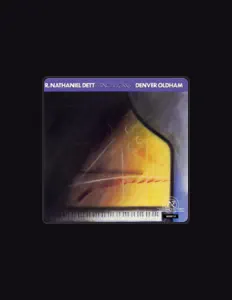

Robert Nathaniel Dett Essentials
Playlist - 26 Songs
Black Canadian American Robert Nathaniel Dett’s most widely performed and recorded work is “Juba”—and no wonder! Written in the upbeat style typical of ragtime, its twinkling right-hand theme and exuberant bass has a surefire charm with audiences that led to many pianists, including the great Percy Grainger, taking it up.
“Juba” is the final piece in Dett’s piano suite In the Bottoms, which played its part in his breakthrough success as a pianist composer in 1914, together with his Magnolia Suite: you may hear pieces from both suites played by a variety of pianists on this playlist—including Dett himself in the final track, playing the lilting “Barcarolle” from In the Bottoms.
Just as important were Dett’s compositions for solo singers and chorus. Try The Chariot Jubilee , originally written for tenor solo, chorus, and orchestra in 1921. Alas, Dett’s original orchestration has been lost, and a number of arrangers have re-orchestrated the work: we include a recording of the version by Jason Max Ferdinand, with soulful and zestful singing by The Aeolians.
Dett, born in Canada but settled in the US from the age of 11, sincerely admired the achievements of European composers. You can hear the influence of Chopin in such piano pieces as “The Place Where the Rainbow Ends” (from Magnolia Suite) and “Barcarolle” (In the Bottoms), and of Grieg and even Wagner in “Beyond the Dream” from his much later piano suite, Enchantment (1922). Dett also absorbed the music of more recent composers in that suite—the avant-garde Russian Scriabin as can be heard in the opening movement, “Incantation.”
Yet Dett insisted that he and his fellow Black American composers should take “the rough timber of Negro themes and fashion from it music which will prove that we, too, have national feelings and characteristics, as have the European peoples whose forms we have zealously followed for so long.” You can hear how Dett took these European influences and used them with the sensibility of his people. His music is filled with melodies either derived from or inspired by spirituals and Black-inspired expressive harmonies.
Dett left his 19th-century influences even further behind after lessons in 1929 with the legendary teacher Nadia Boulanger at the American Conservatory in Fontainebleau, France. There’s a strong French flavor to his lovely setting of the Ave Maria (1930), and even of the visionary modernist Messiaen in the opening pages of Dett’s “The Daybreak Charioteer” from the piano suite Tropic Winter (1938). He also recognized an affinity between Black and Jewish music, incorporating traditional Jewish melodies in his suite Eight Biblical Vignettes (1941). This was his last major work before his sudden death from a heart attack in his early sixties, just as he was en route with the chorus of the United Service Organization (USO) to entertain troops during World War II.







































